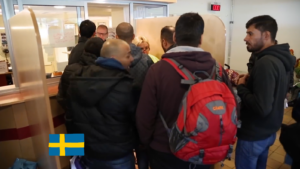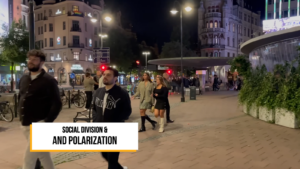___
By Rodaportal
INTRODUCTION
Migration and multiculturalism are two topics that have garnered significant attention and debate worldwide. The complexities and challenges associated with immigration are undeniable, and if not addressed effectively, they can lead to adverse consequences. In this article, we will explore the multifaceted aspects of unchecked migration and multiculturalism, using Sweden’s experience as a case study. Our aim is not just to highlight the problems but also to delve into solutions and emphasize the importance of well-thought-out, strategic approaches to these complex issues. Join us on this educational journey!
The Multiculturalism Debate in Sweden:
Multiculturalism, often celebrated as a symbol of diversity and inclusivity, is a defining characteristic of many nations. Sweden, once recognized for its social cohesion and cultural homogeneity, witnessed a transformation in its immigration policy in recent decades. Before welcoming a significant number of immigrants from outside Europe, Sweden’s immigration was relatively low, with an average of around 6,000 immigrants per year between 1871 and 1940, mostly from neighbouring countries such as Germany, Denmark, and Norway, who shared linguistic and cultural similarities with the native Swedish population.
Sweden enjoyed a high standard of living, a well-functioning welfare state, and a low crime rate. The society was tightly-knit, with shared values and a common purpose. However, with the entry of multiculturalism into Sweden’s political mainstream, the country began accepting refugees from non-European countries, leading to a substantial increase in the proportion of immigrants of non-European origin from 2% to 15% between 1985 and 2015.

The rapid change in Sweden’s immigration policy led to integration challenges, with many immigrants struggling to find employment and adapt to Swedish society. This transition resulted in higher crime rates, especially in marginalized immigrant communities, where criminal gangs often recruited young immigrants who felt excluded from society.
Sweden’s experience underscores the importance of finding a balance between celebrating diversity and ensuring social cohesion. It highlights the need for thoughtful immigration policies that promote integration and shared values while preserving a nation’s identity and security.
Economic Implications:
Unchecked migration can have significant economic consequences, especially when a considerable portion of immigrants face integration difficulties. Sweden’s economy, which was once robust, experienced changes as it opened its doors to immigrants from non-European countries. This influx of immigrants increased the demand for social services, putting a strain on public resources. Many immigrants relied on state assistance, adding a financial burden to the Swedish economy and diverting funds from crucial services like healthcare, education, and infrastructure development.
Sweden’s experience serves as a reminder of the importance of immigration policies that align with a nation’s economic needs. Policies should promote integration and self-sufficiency among immigrants to ensure their positive contribution to the economy, rather than relying solely on state support. Striking a balance between the economic benefits of immigration and potential economic strain is crucial for addressing the challenges posed by multiculturalism and migration.

Crime and Security Concerns:
Sweden’s experience illustrates how a lack of integration can contribute to higher crime rates. Criminal gangs, often composed of marginalized immigrant youths, have become more prevalent in the country, leading to security issues related to gang violence, drug trafficking, and organized crime. These issues not only pose security threats but also impact the overall quality of life in affected areas, raising concerns about public safety.

Social Division and Polarization:
The debate around multiculturalism in Sweden has exposed significant societal divisions and polarization. Different cultural groups may not share common values or understand each other’s perspectives, leading to social fragmentation. This division makes it challenging for Swedish society to find common ground on important issues, contributing to political polarization and impeding effective responses to social, political, and economic challenges.

The Need for Reform:
Sweden’s experience highlights the need for reform in addressing the consequences of unchecked migration and multiculturalism. Host countries must consider implementing comprehensive policies that prioritize integration, language and cultural education programs, and alignment with economic needs. Immigration should be calibrated to correspond with the nation’s goals, ensuring that immigrants are equipped to actively contribute to the workforce and overall prosperity.

Conclusion:
Sweden’s journey offers valuable lessons for nations worldwide grappling with the balance between celebrating diversity and ensuring social cohesion. Responsible and effective immigration policies are crucial, and Sweden’s experience underscores this fact. If you found this article informative and engaging, we encourage you to watch our video on the subject, titled “Migration and Multiculturalism Crisis: Sweden’s Retreat” by clicking on the link here: [https://youtu.be/TgaWLmnRG9s]. Stay informed and engaged, and thank you for joining us today. We look forward to exploring more vital topics with you in the future.
